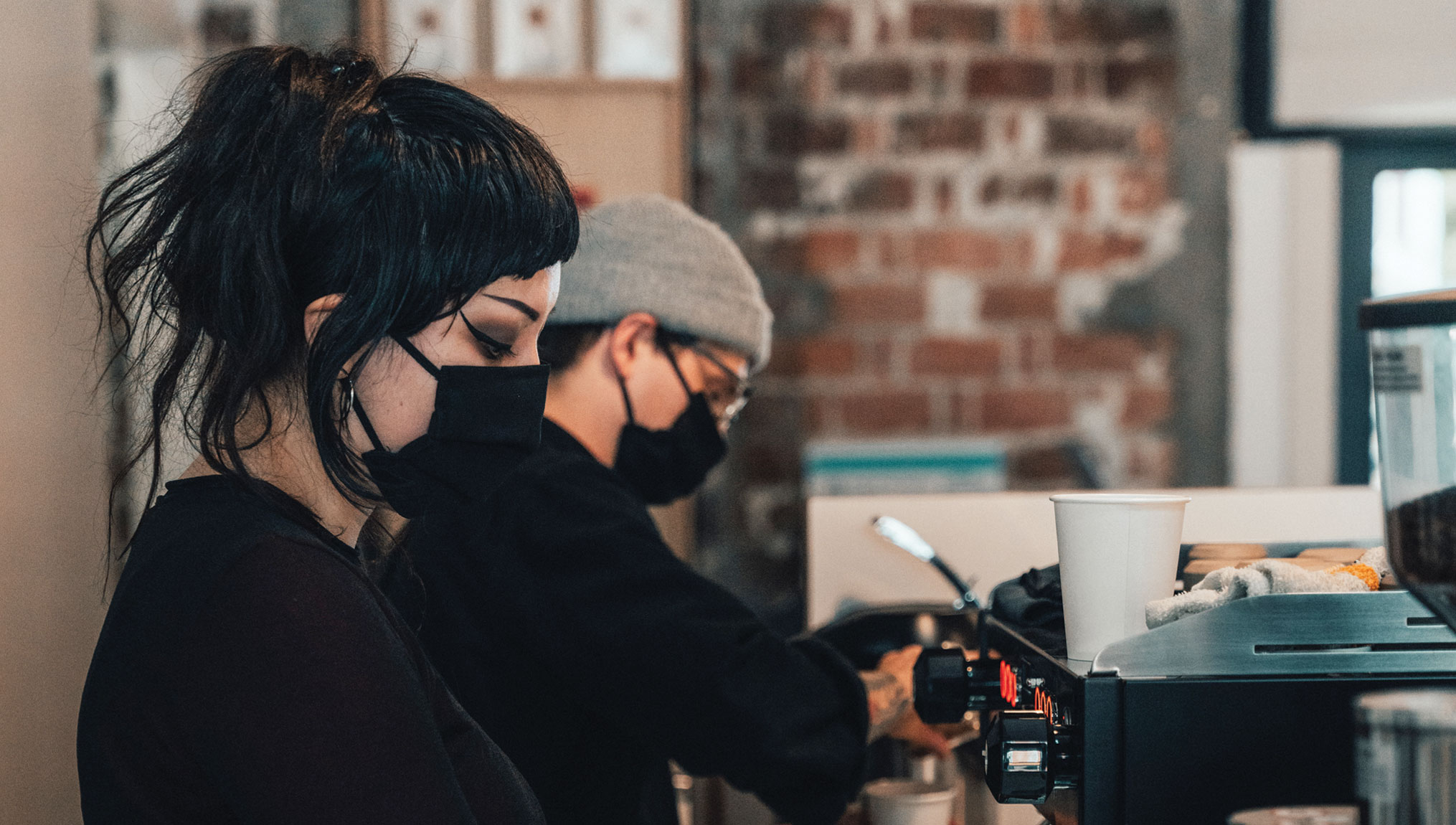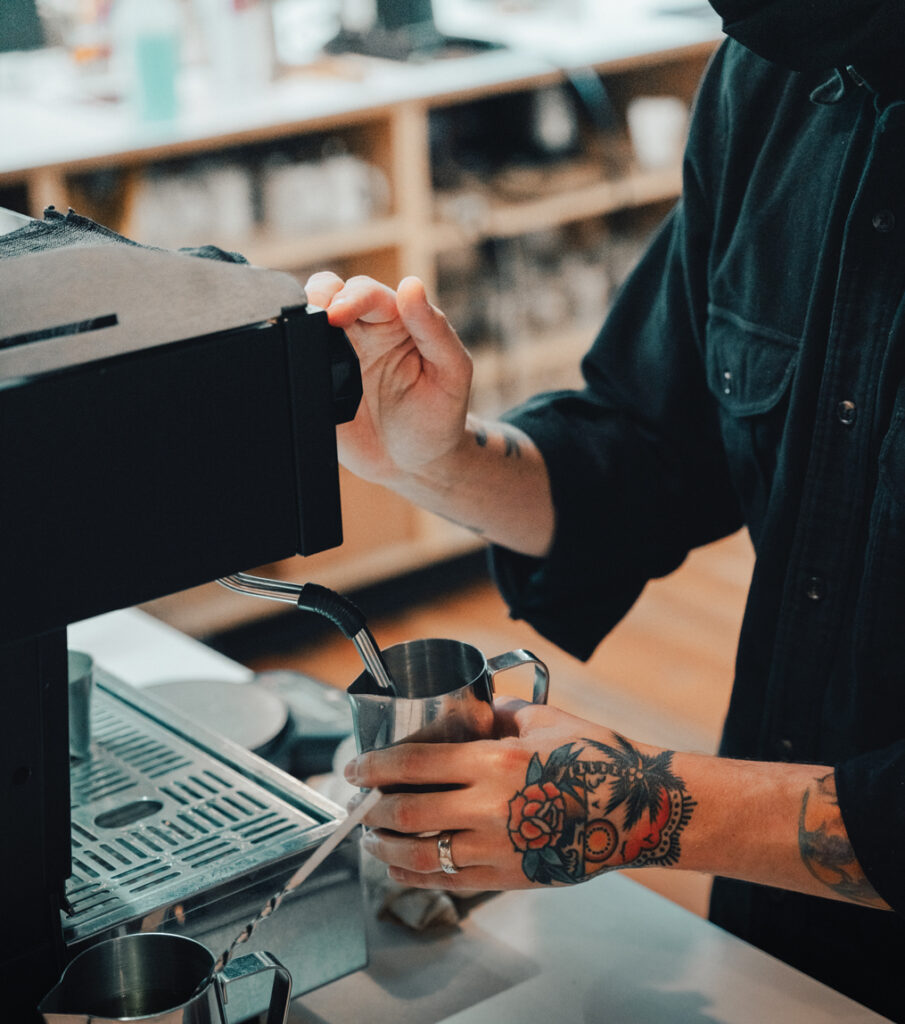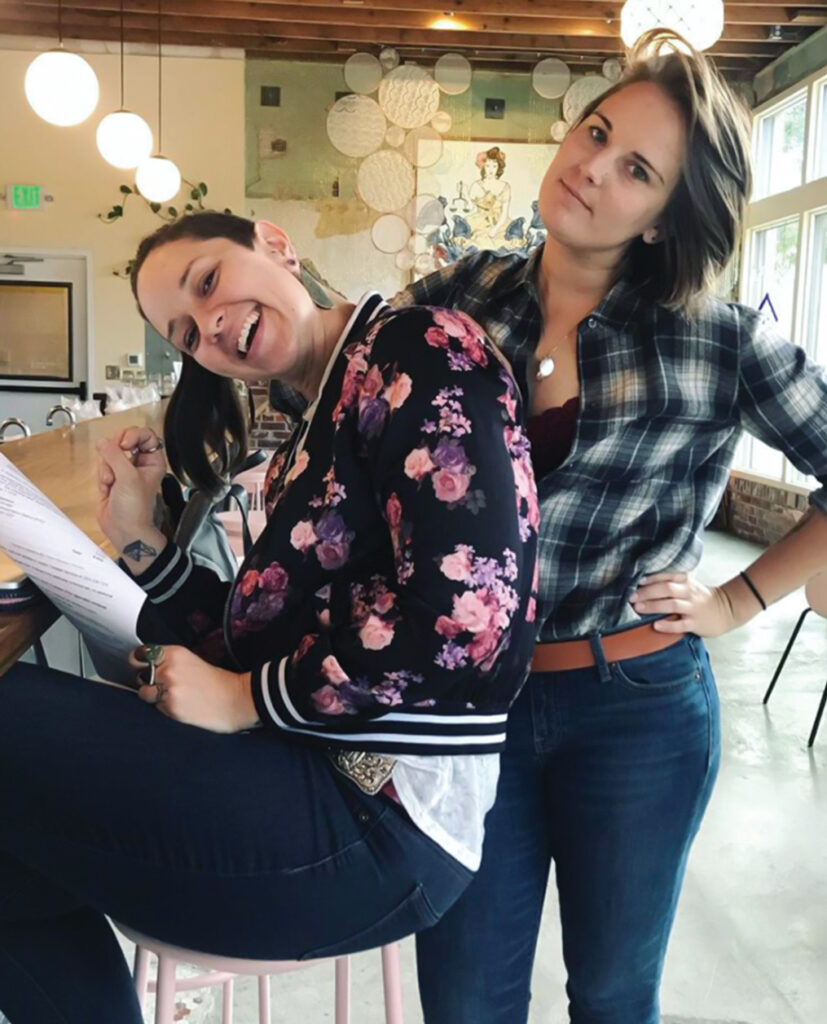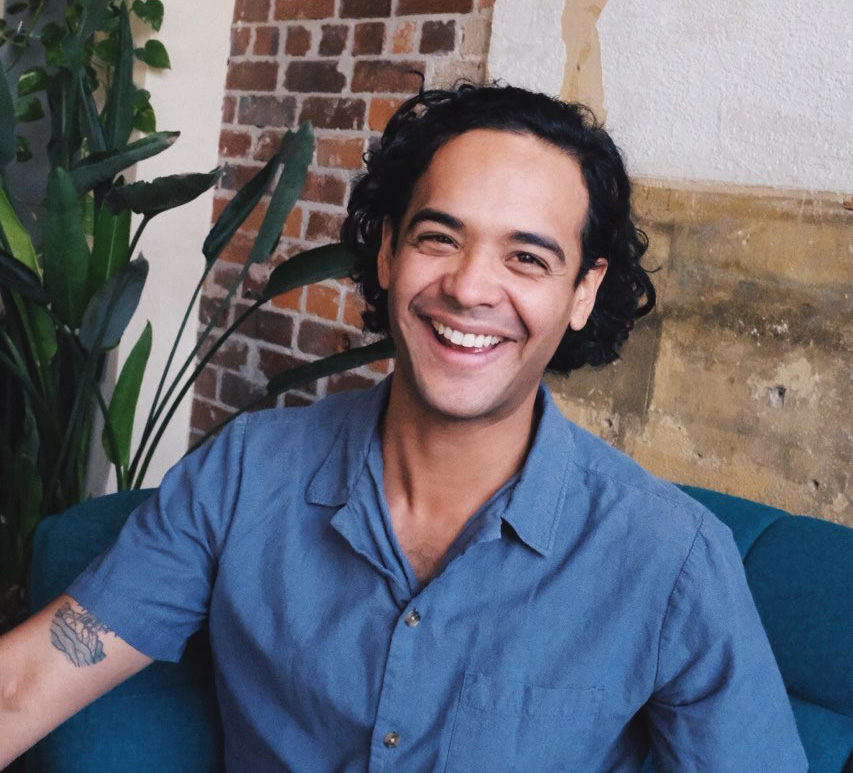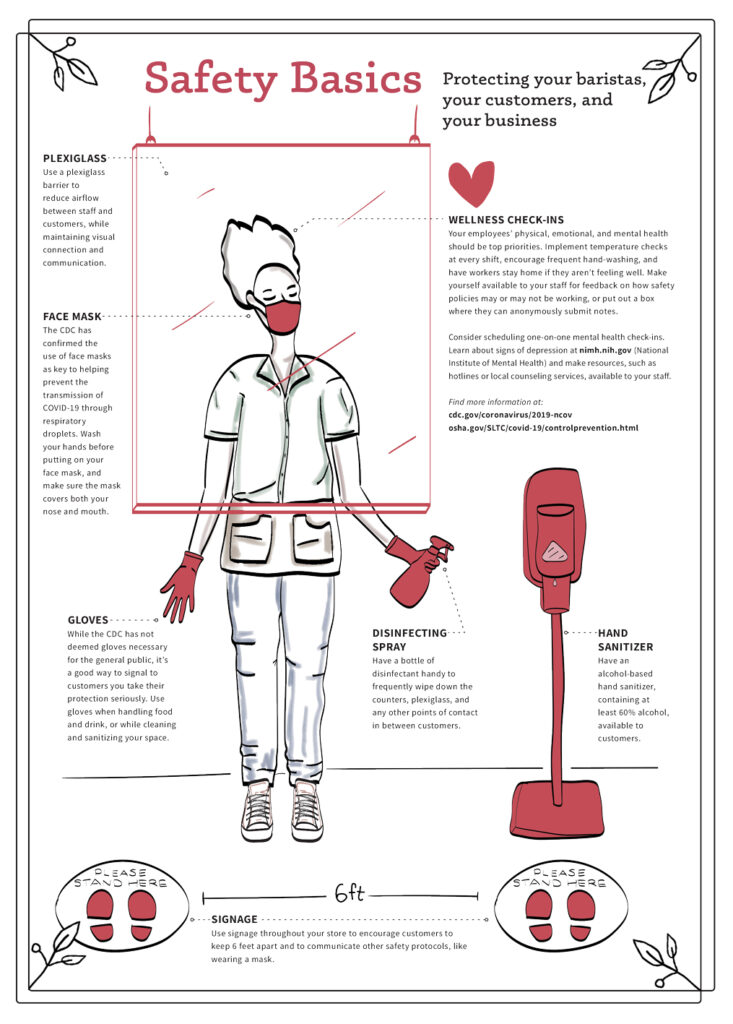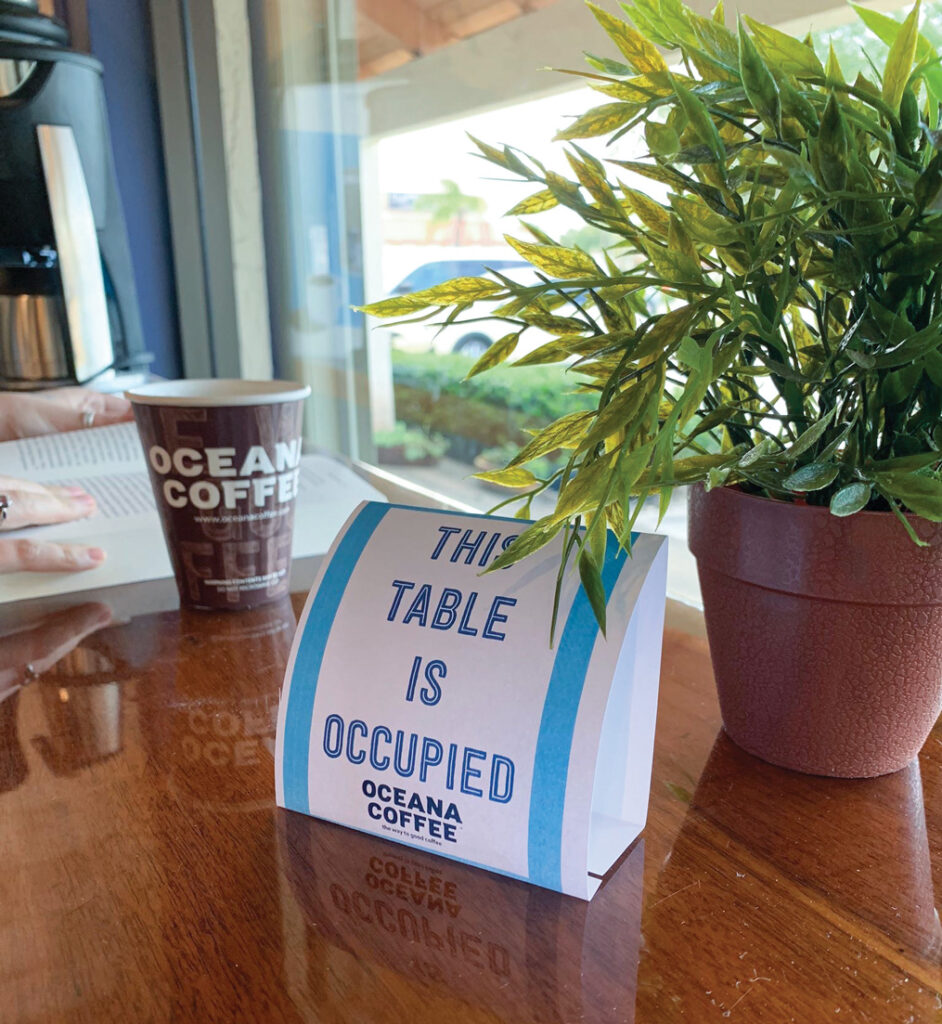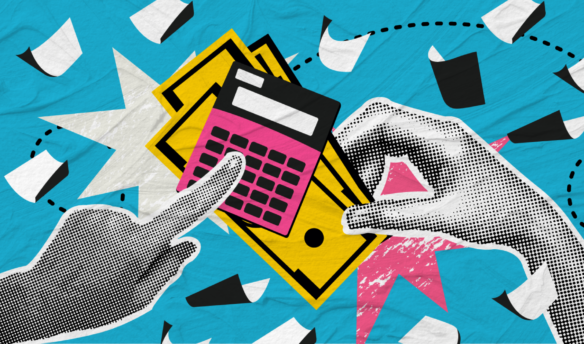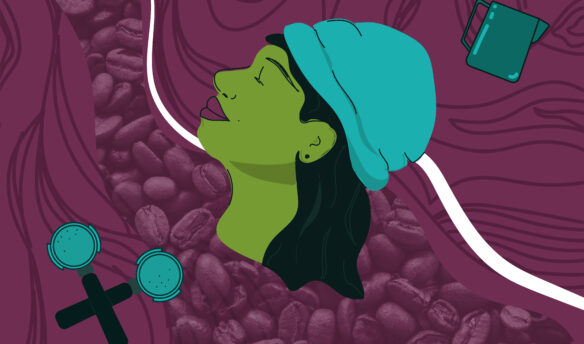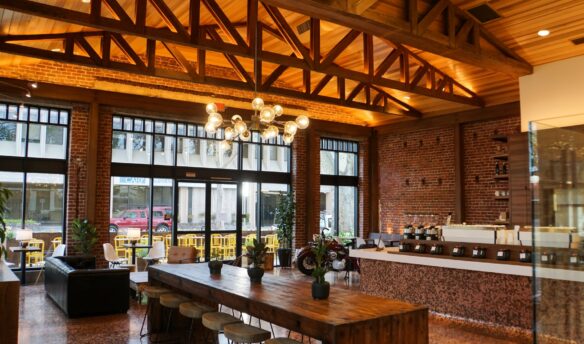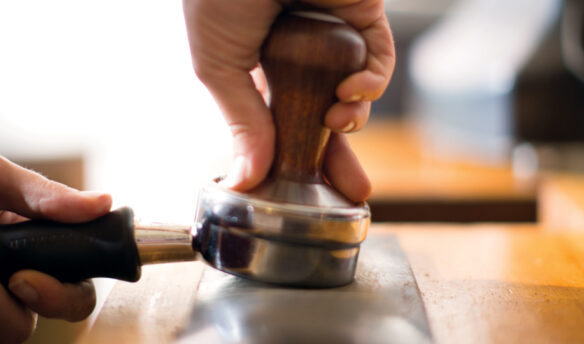Baristas at Broadcast Coffee. Photo by Garrett Hanson
Earlier in the year, as the number of COVID-19 confirmed cases and deaths soared into the thousands, the service industry quickly found that no amount of caution or planning could have prevented the uncertainty that followed.
Around mid-March, most of the U.S. had enforced some kind of shelter-in-place order to help slow transmission of the virus. Temporary or permanent closures of restaurants meant the loss of some 5.9 million jobs at the beginning of May. Virtual tip jars and crowdsourced funds cropped up across the country to help suddenly jobless baristas before the Paycheck Protection Loan or unemployment benefits kicked in. Even for cafés with strong work cultures and exceptional commitments to staff, business losses still meant tragic layoffs.
California’s Bay Area-based Paper Moon Coffee Co. offers employees a 401k plan, healthcare, and paid time off benefits. Last year, CEO Wendy Warren went a step further when she finalized 501(c)(3) nonprofit Coffee Housing, an ambitious initiative that would provide affordable housing for baristas in the Silicon Valley. However, COVID-19 put Paper Moon at risk of closing their Santa Clara location, and Warren says “I’ve lost approximately $70,000, and I need to break even in the next 2–3 months or I will start to lose money that won’t have any chance of being recovered.”
The outlook for coffee businesses was grim. If 2019 was marked by a wave of barista-led activism, what did that amount to in the wake of a pandemic? Lamplighter Coffee Roasters temporarily closed their Richmond, Virginia, locations. Seattle’s Broadcast Coffee reduced their hours and laid off 12 of their 20 employees. Amethyst Coffee Company closed all three Denver shops on March 16, and a team of 17 was reduced to two: co-owners Elle Taylor and Breezy Sanchez. These hardships certainly weren’t unique. On the surface, it might seem like COVID-19 would be a terrible time to restructure a business, but for these cafés, there has never been a more perfect time to reprioritize workplace equity and inclusion.
Recentering The Barista
COVID-19 forced Lamplighter to close their three locations on March 23, laying off most of their 77 employees. They donated the use of their Summit Avenue coffee bar and roast lab to Richmond Mutual Aid, a grassroots organization that provides food, supplies, and funds to those in need. Lamplighter reopened their flagship Addison Street location on April 11, revising their menu to provide mostly locally sourced, nutrient-dense food offerings at accessible prices. Co-owner and managing partner Noelle Forest says scaling down has led Lamplighter to reevaluate their foundations. Started in 2009, without many resources or help, Lamplighter adopted a more traditional business model as they grew to three locations. Starting over with a smaller team feels more authentic to Lamplighter’s roots, and gives all staff a more equitable voice in the company, as well as raises and paid sick time benefits going forward.
“Now that everything has been completely shut down, it’s been an opportunity to really evaluate. What was working well before? What wasn’t working before? And the things that have been really bad were from things that were already problems in the industry for our workers before,” says Forest. “People have to realize that more than ever these people are some of the least protected in our society who are serving food or preparing things like this. For us it’s been a really big opportunity to look at everything we’re doing and just say, ‘Wow, we don’t really want to build it back up the same way it was before. Maybe we can revamp not just how we’re going to seat people or how people are going to be touching things, but how can we really restructure in a way that’s going to be different?’”
Before COVID, Broadcast was intentional about prioritizing their staff. Molly Flynn, project coordinator and service repair tech, remembers past instances where owner Barry Faught and general manager Natalie Walker “found ways to support the staff in times of need, whether it came from finding a few dollars in the business, or if Barry paid out of his own pocket. The whole leadership team has really stepped up to take care of the staff and I think it’s just important for people to know that’s just a core value at Broadcast is to care for the staff, and that’s not solely a response to COVID.”
The pandemic gave Broadcast time to acquire new tools to move forward as a stronger company. In addition to staff raises, plans are in the works for anti-racist training and educational classes (both coffee-related and not), as well as the creation of an Employee Wellness Fund.
The wellness fund is a continuation of an early initiative started by their Gimme Shelter blend. Five dollars from each bag sold of Gimme Shelter went to support their underemployed baristas, including the furloughed ones. Now that the company has brought back all 20 of their employees, the idea exists as a long-term fund.
“Moving forward, every coffee we have, as a blend or single-origin whole bean offering that we have, a dollar of that goes to the fund. Every single bean purchase, some portion of that pays into it,” Walker explains, also adding that a portion of seasonal drink sales as well as all proceeds from their hand sanitizer sales will go to the fund, with Faught matching up to $10,000.
The fund is available for any staff person in need, for example, offers Walker, a barista needing more time off after exhausting their sick pay benefits.
“Even without a pandemic and a social uprising,” she says, “there are things that come up in people’s lives where they need some kind of extra support, and we want to be able to do what we can as an organization to take care of the folks who are working for us.”
Broadcast has also been deliberating another issue: gratuity.
“We are trying to navigate the pros and cons of whether we continue to offer tips. That may or may not change in the future,” says Walker. “It’s a touchy area because we want our staff to be financially taken care of, and for them right now that includes tips. We’re discussing what we might need to do as a company to take that out of the equation and offer a wage that would be fair, beyond fair.”
The Importance of Pay Equity
Amethyst Coffee Co. had also grappled with the issue of equity and gratuity. On May 12, one day before reopening two of their four locations after closing mid-March, Amethyst announced they were eliminating gratuity and raising prices by 50% across the board. Though certainly not the only café to do away with gratuity, at Amethyst the decision means “everyone makes the same rate. Everyone’s at 50k a year and 30–35 hours [a week],” says Sanchez.
To some it seemed like a drastic move, but pre-pandemic, the company hadn’t raised their prices in several years. Amethyst was already talking about increasing prices 30% to keep up with the rising cost of goods, and challenging the gratuity system had been on everyone’s minds. Co-owners Sanchez and Taylor combed through their monthly budget “with a microscope.” If they were going to restructure Amethyst, they reasoned, why not now?
“In this time of unprecedented economic crisis and humanitarian crises, if we can’t take stances for the working class and what’s going on, it seems like such a waste not to,” says Sanchez. “There’s a chance that Amethyst might be gone in a year. We might as well just try really hard to do what we actually want to do and combat these bigger things even though it’s scary, but I’d also be scared if we did this or not.”
The May 12 announcement was largely met with positive feedback, but there were some who disagreed with the move.
“I feel very lucky that we have a pretty big platform to be able to speak out about it, and make some pretty drastic changes to the company that not everyone agrees with,” she says. “Some of the backlash we got was from the baristas themselves in the community, which kind of surprised me and kind of didn’t at the same time. If you have stuff so deeply ingrained in you and that’s what you know, of course you’re going to combat it and break it down.”
As of August, Amethyst has six employees, a staff size that will remain for the foreseeable future, according to Sanchez.
Enforcing A Mask Policy
Not to be overlooked, making a clear stance on face mask rules and enforcing them is a tangible way for businesses to prioritize the safety of their staff. However, baristas are the ones who often shoulder the burden of enforcing mask rules among customers. In Richmond, Virginia, local guidelines put the responsibility of mask protocols on the business, not the customer, which led Lamplighter to delay reopening indoor seating anytime soon.
“The businesses will get fined if people are not wearing masks,” says Forest. “That’s going to put workers in a really bad position in our state to have to enforce people wearing masks and be at the front lines of that philosophical battle is a really unfair position to put staff in. That’s another reason why we’re not going to have people in the building for a while, because I don’t want to put my staff in that position.”
Mask rules might seem like a cut-and-dry issue, but it can get tricky for cafés entering Phase Two, which for most states means reopening indoor seating with reduced occupancy. Customers technically don’t have to wear masks while eating or drinking. That’s the case for Oceana Coffee’s two cafés in Tequesta, Florida. The two shops provide sanitizing stations for customers, and table placards to indicate when a space is occupied.
“If someone does come to sit down, we bring a little place card at their table that says, ‘This space is occupied.’ That little sign doesn’t leave until that guest leaves, and then everything at that table, the chair, everything, gets sanitized,” explains Oceana co-owner Amy Angelo. “It’s a good way for us to communicate with our team whether the space has been cleaned or not. Everything that people may touch: door handles, POS, all of that is sanitized and Lysoled many times throughout the day.”
In Seattle, Broadcast made sure to put large, visible signage at the entrance to help mitigate the additional labor it would take baristas to enforce the protocol.
“It was really important to get that in people’s faces right away so that our staff don’t have the whole burden of enforcing it. It is a burden to have to ask every person, talk to every person about this. We are lucky that our clientele have by and large been wholeheartedly embracing it. The conversations that I’ve had with our team have been to keep it really short and positive,” says Walker. “We do emphasise, ‘Just keep it positive and stand your ground.’ I feel that way about a lot of things, this is just the latest instance of, ‘Here’s something we have to enforce, but I don’t want you to be put in a position where you feel unsafe or have an uncomfortable dialogue that goes on.’ Trying to quickly turn that around is the goal.”
To take some of the burden off of baristas, Broadcast has provided customers hand sanitizing stations and disposable masks if they don’t have their own. Between these extra measures, and backed by a city- or state-wide mandate, it’s easier to enforce.
Aside from being a part of barista advocacy, enforcing a mask policy is a sure way to continue flattening the curve, which will hopefully stave off another wave of closures.
As the latest Re:co Symposium revealed, the coffee world is working hard to make sense of what happens next in a pandemic that’s far from over. Even as the full effects across the supply chain have yet to be seen, the steps that these and other cafés are taking to center the most vulnerable serve as examples of a more equitable future.



